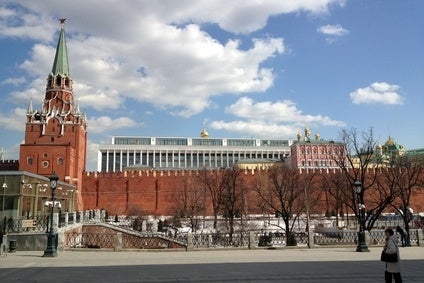In a period of escalating international tensions, Russia is turning to the use of trade restrictions as a political weapon. This adds a layer of risk to food manufacturers exporting goods to the previously promising BRIC market and potentially has some profound consequences for the consumer outlook in the country, Katy Askew suggests.
According to new research from HSBC, Russia has slipped into a technical recession with two successive quarters of negative growth.
“The Russian economy stuck at a near-zero growth in June, yet slipping into a technical recession in 1H 2014, the HSBC Russia Composite PMI survey revealed. Q1 2014 data laid the foundations, with GDP contracting 0.5% in sequential seasonally-adjusted. The economy must have contracted at even faster rate in Q2 2014, on our estimates,” HSBC economist Artem Biryukov said. “Stagflation remains our baseline scenario for 2H 2014.”
Biryukov suggested the primary reason for GDP turning negative is a drop in investment going into the country. “The recent spike in geopolitical tensions amid the Russia-Ukraine stand-off will likely have long lasting negative effects on private fixed investment growth in Russia. This will hamper economic recovery in Russia in 2014-15,” he predicted.
While Russia rounded out last year on the upswing, slowly shrugging off the last vestiges of the global economic crash, the economic outlook for the country turned decidedly darker during 2014. As Biryukov noted, many of the causes of Russia’s economic slowdown stem from mounting hostility in the region following this year’s Ukrainian Revolution.
President Vladimir Putin’s move to absorb Crimea in March prompted US and EU sanctions. Fierce fighting continues in eastern Ukraine between pro-Kiev forces and pro-Russian rebels today. While Russian forces have stopped short of a full invasion, Russian support for the secessionist movement can be seen on a number of fronts – from volunteer Russian soldiers inspired by patriotic rhetoric to punitive arm-twisting over gas prices.

US Tariffs are shifting - will you react or anticipate?
Don’t let policy changes catch you off guard. Stay proactive with real-time data and expert analysis.
By GlobalDataThe impact of these policies is also in evidence in the FMCG sector.
Ukrainian confectioner Roshen was among the first casualties of the non-linear war of trade restrictions and sanctions being waged.
The company, owned by “candy king” and now Ukrainian President Petro Poroshenko, had its Russian assets seized and frozen during the Ukrainian presidential campaign. Moscow claimed it was standard procedure following a trademark spat with partly state-owned Russian firm United Confectioners. The total amount seized equates to RUB2.8bn (US$80.5m) in cash, Roshen said.
While a company owned by the Ukrainian President might seem like an obvious target for this kind of covert sanction, this is not the only example of politically motivated trade restrictions hitting operators in the food sector.
Russia banned pork imports from the EU after cases of African swine fever were detected in Lithuania and Poland in January. However, the EU – which has stood firm in its support of Ukrainian autonomy – has called on the WTO to intervene with officials insisting that the disease has been contained.
“EU products from non affected areas are perfectly safe,” EU commissioner for health Tonio Borg said last month. “Despite our efforts over the last five months and numerous bilateral trade contracts we have with Russia, there is no sign that Russia will allow trade to resume.”
Russia previously accounted for almost one-quarter of the EU’s pork product exports and the trade spat has weighed on EU meat groups including Finnish Atria and HKScan.
Russia has also moved to block imports of products manufactured by a Ukrainian subsidiary of Netherlands-based dairy group Milkiland. Russia’s consumer protection authority, the Rospotrebnadzor, said tests of Milkiland products “revealed their inadequacy for fatty acid consumption”. The agency added there is “evidence” of “microbial contamination”, without providing further details.
Milkiland’s reaction was a strongly worded statement that insisted the ban has “nothing to do with the quality” of the group’s products.
“These restrictions do not address specific products but a group of seven production facilities, four of which have not supplied anything to the Russian Federation for over five last years. This fact suggests that it has nothing to do with the quality of our products,” CEO Anatoly Yurkevych said. “We repeatedly appealed to the Federal Service to establish a constructive dialogue, to examine the problems and to develop an action plan to address them. Unfortunately, Rospotrebnadzor has ignored our appeals and we have received no reply to our requests.”
Last week also saw Russia restrict various meat imports from Moldova – including processed beef, horsemeat, lamb and pork. The Russian veterinary authority, the Rosselkhoznador, cited concerns over African swine fever for its decision.
The move was announced on the same day Moldova backed a free trade and political association deal with the EU. Thirty-eight MPs from Moldova’s pro-Russian Communist party staged a walk out in protest against the vote.
Using trade sanctions as a political tool is bad news for the specific FMCG companies caught up in the fallout. It is also bad news for Russia’s economic outlook, with political instability dampening investor zeal. But the negative impact this has on the Russian consumer could well go deeper still.
According to the most recent official data, Russia’s CPI inflation rate stands at 7.58% – with food sales accounting for around 30% of the index. Food prices increased 9% in April year-on-year, with the import ban on EU pork pushing up meat prices as shortages prompted consumers to switch to alternative meats.
Inflation and depressed economic growth will be taking their toll on consumer sentiment and purchasing power. Russian consumers could therefore prove the greatest victims of trade restrictions and other economic policies employed by their own government.





